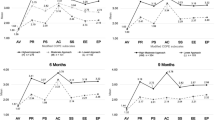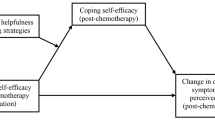Abstract
Purpose
It is examined whether coping reactions of women with a first manifestation of non-metastatic breast cancer are stable over time. It will be further determined whether there is a pattern in coping processes. Also predictors of coping variability will be identified, with the overall aim to evaluate the relevance of repeated coping measurement.
Methods
Semi-structured interviews were conducted twice with 254 breast cancer patients at baseline shortly after breast cancer surgery and again approximately 12 months later. Data pertaining to coping behaviour were collected and successively evaluated according to a standardized coping manual, the Hannover Coping Manual (HCM). Analyses of variance were used to examine the stability of HCM-coping dimensions as well as socio-demographic effects.
Results
Emotional coping responses remained stable over time, while various dimensions associated with cognitive coping showed considerable variability. Chemotherapy turned out to have the strongest effects on coping.
Conclusions
The findings of this prospective study are emphasizing the use of repeated coping assessments. They also underline the importance of social support for adaptive coping and point to the necessity of patient empowerment, especially in women receiving chemotherapy.
Similar content being viewed by others
References
Lazarus RS (2006) Emotions and interpersonal relationships: toward a person-centered conceptualization of emotions and coping. J Pers 74:9–46. doi:10.1111/j.1467-6494.2005.00368.x
Taylor SE, Stanton AL (2007) Coping resources, coping processes, and mental health. Annu Rev Clin Psychol 3:377–401. doi:10.1146/annurev.clinpsy.3.022806.091520
Greer S (2002) Psychological intervention—the gap between research and practice. Acta Oncol 41:238–243. doi:10.1080/02841860260088773
Avis NE, Crawford S, Manuel J (2005) Quality of life among younger women with breast cancer. J Clin Oncol 23:3322–3330. doi:10.1200/JCO.2005.05.130
Watson M, Haviland JS, Greer S, Davidson J, Bliss JM (1999) Influence of psychological response on survival in breast cancer: a population-based cohort study. Lancet 354:1331–1336. doi:10.1016/S0140-6736(98)11392-2
Stanton AL, Danoff-burg S, Huggins ME (2002) The first year after breast cancer diagnosis: hope and coping strategies as predictors of adjustment. Psychooncology 11:93–102. doi:10.1002/pon.574
Holland KD, Holahan CK (2003) The relation of social support and coping to positive adaptation to breast cancer. Psychol Health 18:15–29. doi:10.1080/0887044031000080656
Falagas ME, Zarkadoulia EA, Ioannidou EN, Peppas G, Christodoulou C, Rafailidis PI (2007) The effect of psychosocial factors on breast cancer outcome: a systematic review. Breast Cancer Res 9. doi:10.1186/bcr1744
Tschuschke V, Hertenstein B, Arnold R, Bunjes D, Denzinger R, Kaechele H (2001) Associations between coping and survival time of adult leukemia patients receiving allogeneic bone marrow transplantation results of a prospective study. J Psychosom Res 50:277–285. doi:10.1016/S0022-3999(01)00202-1
Greer S, Morris T (1975) Psychological attributes of women who develop breast cancer: a controlled study. J Psychosom Res 19:147–153. doi:10.1016/0022-3999(75)90062-8
Greer S, Morris T, Pettingale KW (1979) Psychological response to breast cancer: effect on outcome. Lancet 2:785–787. doi:10.1016/SO140-6736(79)92127-5
Chesney MA, Chambers DB, Taylor JM, Johnson LM, Folkman S (2003) Coping effectiveness training for men living with HIV: results from a randomized clinical trial testing a group-based intervention. Psychosom Med 65:1038–1046. doi:10.1097/01.PSY.0000097344.78697.ED
Greer S, Moorey S, Baruch JDR, Watson M, Robertson BM, Mason A, Rowden L, Law MG, Bliss JM (1992) Adjuvant psychological therapy for patients with cancer: a prospective randomised trial. Br Med J 304:675–680
Tschuschke V (2011) Psychoonkologie: Psychologische Aspekte der Entstehung und Bewältigung von Krebs. Schattauer, Stuttgart
Lazarus RS (1993) Coping theory and research: past, present, and future. Psychosom Med 55:234–247
Roussi P, Krikeli V, Hatzidimitriou C, Koutri I (2007) Patterns of coping, flexibility in coping and psychological distress in women diagnosed with breast cancer. Cogn Ther Res 31:97–109. doi:10.1007/s10608-006-9110-1
Folkman S (2009) Questions, answers, issues, and next steps in stress and coping research. Eur Psychol 14:72–77. doi:10.1027/1016-9040.14.1.72
Mohammed A, Huda A, Mansour A (2009) Coping with a diagnosis of breast cancer-literature review and implications for developing countries. Breast J 15:615–622. doi:10.1111/j.1524-4741.2009.00812.x
Kissane DW, Bloch S, Smith GC, Miach P, Clarke DM, Ikin J, Love A, Ranieri N, McKenzie D (2003) Cognitive-existential group psychotherapy for women with primary breast cancer: a randomized controlled trial. Psychooncology 12:532–546. doi:10.1002/pon.683
Spiegel D, Morrow GR, Classen C, Raubertas R, Stott PB, Mudaliar N, Pierce HI, Flynn PJ, Heard L, Riggs G (1999) Group psychotherapy for recently diagnosed breast cancer patients: a multicenter feasibility study. Psychooncology 8:482–493. doi:10.1002/(SICI)1099-1611(199911/12)8:6<482::AID-PON402>3.0.CO;2-W
Goodwin PJ, Leszcz M, Ennis M, Koopmans J, Vincent L, Guther H, Drysdale E, Hundleby M, Chochinov HM, Navarro M, Speca M, Masterson J, Dohan L, Sela R, Warren B, Paterson A, Pritchard KI, Arnold A, Doll R, O'Reilly SE, Quirt G, Hood N, Hunter J (2001) The effect of group psychosocial support on survival in metastatic breast cancer. New Engl J Med 345:1719–1726. doi:10.1056/NEJMoa011871
Folkman S, Moskowitz JT (2004) Coping: pitfalls and promise. Annu Rev Psychol 55:745–774. doi:10.1146/annurev.psych.55.090902.141456
Geyer S, Noeres D, Mollova M, Sassmann H, Prochnow A, Neises M (2008) Does the occurrence of adverse life events in patients with breast cancer lead to a change in illness behaviour? Support Care Cancer 16:1407–1414. doi:10.1007/s00520-008-0492-3
Geyer S, Ellis R, Koch-Gießelmann H (2009) Das Hannoversche Copinginventar: Ein qualitatives Verfahren zur Untersuchung der Problembewältigung bei Frauen mit Mammakarzinom. In: Neises M, Weidner K (eds) Qualitative Forschungsansätze und Ergebnisse in der psychosomatischen Frauenheilkunde, 1st edn. Pabst Science Publisher, Lengerich, pp 173–193
Ziegelmann JP, Lippke S (2009) Theory-based approaches to stress and coping: emerging themes and contemporary research. Eur Psychol 14:3–6. doi:10.1027/1016-9040.14.1.3
Franks HM, Roesch SC (2006) Appraisals and coping in people living with cancer: a meta-analysis. Psychooncology 15:1027–1037. doi:10.1002/pon.1043
Lester N, Smart L, Baum A (1994) Measuring coping flexibility. Psychol Heal 9:409–424. doi:10.1080/08870449408407468
Schou I, Ekeberg Ø, Ruland CM (2005) The mediating role of appraisal and coping in the relationship between optimism–pessimism and quality of life. Psychooncology 14:718–727. doi:10.1002/pon.896
Grulke N, Bailer H, Hertenstein B, Kächele H, Arnold R, Tschuschke V, Heimpel H (2005) Coping and survival in patients with leukemia undergoing allogeneic bone marrow transplantation—long-term follow-up of a prospective study. J Psychosom Res 59:337–346. doi:10.1016/j.jpsychores.2005.02.006
Lazarus RS (1999) Hope: an emotion and a vital coping resource against despair. Soc Res 66:653–678
Lelorain S, Bonnaud-Antignac A, Florin A (2010) Long term posttraumatic growth after breast cancer: prevalence, predictors and relationships with psychological health. J Clin Psychol Med Settings 17:14–22. doi:10.1007/s10880-009-9183-6
Heim E, Valach L, Schaffner L (1997) Coping and psychosocial adaptation: longitudinal effects over time and stages in breast cancer. Psychosom Med 59:408–418
Frick E, Tyroller M, Panzer M (2007) Anxiety, depression and quality of life of cancer patients undergoing radiation therapy: a cross-sectional study in a community hospital outpatient centre. Eur J Cancer Care 16:130–136. doi:10.1111/j.1365-2354.2006.00720.x
Heim E, Augustiny KF, Schaffner L, Valach L (1993) Coping with breast cancer over time and situation. J Psychosom Res 37:523–542. doi:10.1016/0022-3999(93)90008-4
Costanzo ES, Lutgendorf SK, Mattes ML, Trehan S, Robinson CB, Tewfik F, Roman SL (2007) Adjusting to life after treatment: distress and quality of life following treatment for breast cancer. Br J Cancer 97:1625–1631. doi:10.1038/sj.bjc.6604091
Browall M, Persson L, Ahlberg K, Karlsson P, Danielson E (2009) Daily assessment of stressful events and coping among post-menopausal women with breast cancer treated with adjuvant chemotherapy: original article. Eur J Cancer Care 18:507–516. doi:10.1111/j.1365-2354.2008.00994.x
Maly RC, Umezawa Y, Leake B, Siliman RA (2005) Mental health outcomes in older women with breast cancer: impact of perceived family support and adjustment. Psychooncology 14:535–545. doi:10.1002/pon.869
Strand BH, Kunst A, Huisman M, Menvielle G, Glickman M, Bopp M, Borell C, Borgan JK, Costa G, Deboosere P, Regidor E, Valkonen T, Mackenbach JP (2007) The reversed social gradient: higher breast cancer mortality in the higher educated compared to lower educated. A comparison of 11 European populations during the 1990s. Eur J Cancer 43:1200–1207. doi:10.1016/j.ejca.2007.01.021
Bifulco A, Brown GW (1996) Cognitive coping response to crises and onset of depression. Soc Psychiatry Psychiatr Epidemiol 31:163–172. doi:10.1007/BF00785763
Lauver DR, Connolly-Nelson K, Vang P (2007) Stressors and coping strategies among female cancer survivors after treatments. Cancer Nurs 30:101–111. doi:10.1097/01.NCC.0000265003.56817.2c
Roberts BW, Walton KE, Viechtbauer W (2006) Patterns of mean-level change in personality traits across the life course: a meta-analysis of longitudinal studies. Psychol Bull 132:1–25. doi:10.1037/0033-2909.132.1.1
Roberts BW, Mroczek D (2008) Personality trait change in adulthood. Curr Dir Psychol Sci 17:31–35. doi:10.1111/j.1467-8721.2008.00543.x
Aarstad HJ, Aarstad AKH, Heimdal J, Olofsson J (2005) Mood, anxiety and sense of humor in head and neck cancer patients in relation to disease stage, prognosis and quality of life. Acta Oto-Laryngol 125:557–565. doi:10.1080/00016480510027547
Albus C (2010) Psychological and social factors in coronary heart disease. Ann Med 42:487–494. doi:10.3109/07853890.2010.515605
Geyer S, Schlanstedt-Jahn U (2011) Are there social inequalities in the utilisation of oncological rehabilitation by breast cancer patients? Gesundheitswesen. doi:10.1055/s-0030-1269840
Acknowledgements
This paper is based on a cohort study on the role of social and psychological factors in the course of breast cancer. It was supported by the German Research Association (Deutsche Forschungsgemeinschaft, grant numbers GE1167/1-1 and GE1167/1-2). We also thank the breast cancer patients for having consented to participate in this study over such a long period of time. The project had not been possible without the continuous support of the cooperating clinics, the Oststadt Hospital/Hannover Medical School (director, Prof. Dr. Peter Hillemanns), the Clinics of the Henrietten Foundation (director, PD. Dr. Wulf Siggelkow) and the Nordstadt Clinic (director, Prof. Dr. Werner Bader).
Disclosures of conflicts of interest
None.
Author information
Authors and Affiliations
Corresponding author
Rights and permissions
About this article
Cite this article
Hervatin, R., Sperlich, S., Koch-Giesselmann, H. et al. Variability and stability of coping in women with breast cancer. Support Care Cancer 20, 2277–2285 (2012). https://doi.org/10.1007/s00520-011-1334-2
Received:
Accepted:
Published:
Issue Date:
DOI: https://doi.org/10.1007/s00520-011-1334-2




